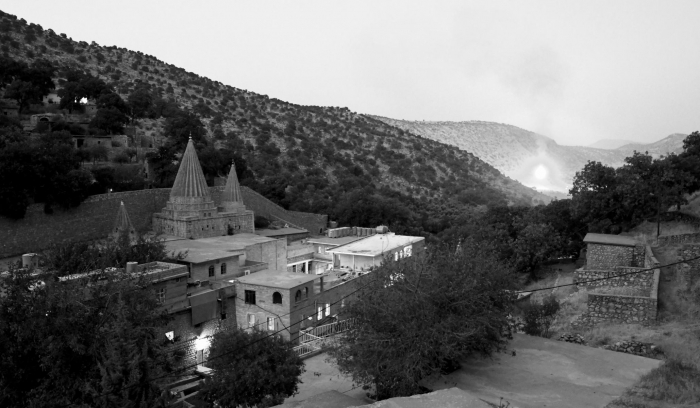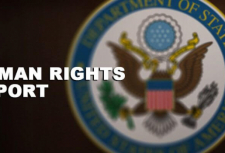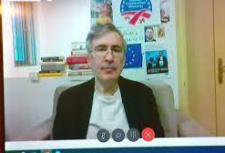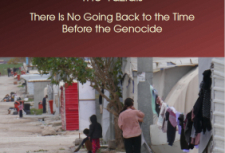Ezdiki – the language of the Ezidis? Part 1

Since the genocide began in 2014, the Ezidi community has been the subject of countless discussions. On the one hand, because their religion and culture are still foreign to most people, on the other hand, because the obvious lack of information about history leads to frequent discussions about the identity of the Ezidis. Young Ezidis and Kurds, active on social networks, in particular, regularly discuss the ethnicity of the Ezidis and their language. Often there are opposing, hostile views, especially when some Ezidis insist on the term “Ezdiki” as the name of their language. But does it really exist? This question will be pursued in the following.
Mother tongue and sacral language
The native language of almost all Ezidis as well as the sacral language of Ezidis is the language designated as Kurmanji (Kurmancî). Nearly all Ezidi prayers, hymns (Qewls) etc. have been handed down in Kurmanji. In this context, this language has a special meaning for the Ezidis.
Kurmanji is regarded by Kurds as a dialect of the Kurdish language, whereby Kurds usually assume the existence of only one Kurdish language, which is divided into various dialects and vernaculars. However, there is also the view that Kurmanji is one of several independent Kurdish languages.
In particular, but not exclusively today’s Ezidis from the post-Soviet area use mainly the designation “Ezd(î)kî” for their language. The word “Êzdîkî” is composed of the root “Êz[î]dî” and the suffix “-kî”. The suffix “-kî” has the function of adjectivating the root of the word. Translated “Êzdîkî” thus means “Ezidi”. Thus it turns out that with “Kurmanji” (Kurmancî), “Êzdîkî” and “Kurdish” (Kurd. “kurdî”) there are three so-called glossonyms, i.e. names of this language, which are used.
This at first seems to be a completely banal statement, but already at this point the problem begins: There is a great intolerance towards the use of the glossonym “Ezdiki” – this term is vehemently rejected among others also by intellectual circles of the Ezidis who are mostly Kurdish-nationalistic. It is often excessively opposed to grant the Ezidis this designation for their language. The reasons for this and the social excesses this issue has taken on will be examined in more detail in the following for the first time.
If Ezidis from the post-Soviet area use the glossonym “Ezdiki” as a designation for their language in public, there are often negative reactions only on the basis of the use of this term. These reactions come from Kurdish nationalist circles, among which are often Ezidis who were socialized Kurdish natonistically. They consider the term “Ezdiki” as an attack on the national unity of the Kurds. The debates and arguments resulting from these opposing views, which are often ideologically motivated, make it difficult to objectify the discourse. A general rejection is expressed, for example by sentences like: “Such a language does not exist”, “that is Kurdish and not Ezdiki”, “if you want to speak Ezdiki, then look for another language than Kurdish, because that is ours”, or mockingly: “If you speak “Ezdiki”, the others speak “Muslim”?
There is a number of such constantly repeating behaviour patterns, which are not to be presented here conclusively. The argumentation is sometimes more complicated when political activists, journalists and intellectuals – even Ezidi professors – express such or similar negative views. Other Ezidi intellectuals have so far kept themselves out of this discussion altogether, because the Kurdish side has labeled dealing with this topic alone as betrayal or separatism.
The general tenor can be summarised as follows: The Ezidis should renounce their own designation of their language in favour of a higher goal; the Kurdish nationalist unity. The Ezidis’ own designation is seen as a danger of a national feeling among the Kurds which is still very fragile today.
Does “Ezdiki” exist at all or is it a politically and ideologically motivated neologism? Only through a thorough clarification a consensus and thus an end to ideological disputes is possible.
Language and glossonym
In the discussions it can be observed that the opponents of the term “Ezdiki” do not conceptually differentiate the language itself on the one hand, and the name of the language (the glossonym) on the other. The sentence “You speak Kurdish and not Ezidi” can be understood as contradicting the assertion that Ezidi is another language than Kurdish, or as contradicting the assertion that the glossonym, hence the mere designation “Ezdiki”, does not exist, but only “Kurdish”. What exactly is claimed or meant is almost always left unclear, probably because the claimant himself is often unclear about what exactly he means. In fact, first of all, “Kurmanji” and “Ezdiki” are glossonyms, i.e. names of the same linguistic variety. One and the same language may well have different glossonyms. This is nothing unusual. For example, “Bosnian”, “Serbian” and “Croatian” are different names for the same language. In Pakistan the term Urdu is used whereas in India the term Hindi is used for the same language. These are examples where different groups use different names for the same language spoken by all these groups themselves. The use of the glossonym “Ezdiki” is not “wrong” simply because other groups speak the same language using a different name for them. It is not unusual to have different terms for the same language.
So do the Ezidis speak Kurdish?
It is often said that Ezidis speak “Kurdish” or are “Kurdish-speaking”. Because, as mentioned, many Ezidis use the term “Ezdiki”, it is questionable whether this statement is correct. For example, it would be very unusual to claim that Indians speak Urdu or that Pakistanis speak Hindi. The same applies, for example, to Serbs and Bosniaks regarding Serbian and Bosnian.
Even the question of how the language “Kurdish” is to be defined, in particular whether Kurdish includes several languages or different dialects of only one language, and which language varieties are to be included in both cases, cannot be answered clearly. Kurds themselves are mostly of the opinion that “Kurdish” (Kurd. “kurdî) is a language with different dialects such as Kurmanji, Sorani, Zazaki and Gorani. However, if one reads the German or English Wikipedia article, one speaks of “Kurdish language s“; in the Kurmanji version of the same encyclopedia, however, Kurdish is described as a language with different dialects.
There is no consensus among linguists on how to distinguish between language and dialect. Probably the most widespread view on the distinction between language and dialect is based on the criterion of mutual intelligibility. According to this thesis, all mutually comprehensible language varieties are only dialects of one language, and not mutually comprehensible language varieties which can be assigned to independent languages. The following problem shows why even this demarcation criterion is not convincing and has therefore not led to a consolidated consensus: In a dialect continuum, i.e. in a chain of mutually understandable language varieties, a variety at the end of the dialect continuum could communicate with the adjacent variety or language outside the dialect continuum without the other language varieties within the dialect continuum being able to do the same. Thus, on the basis of the criterion of mutual comprehensibility, it is not possible to draw unambiguous boundary lines, but rather different boundary lines, which each classify language and dialect differently in relation to the chain of language varieties, but then these individual classifications in languages contradict each other. Therefore, there is no scientifically indisputable criterion for the demarcation between language and dialect. The question is therefore also whether the demarcation can be scientifically justified at all. It is probably not. The distinction between language and dialect is more often based on social or political reasons than on scientific reasons. For the same reasons, the choice of the designation of the language may also be omitted, e.g. if the language designation is intended to establish a connection with the ethnicity and/or the home country, the glossonym is to correspond to the ethnonym and/or the toponym (example: German – Germans – Germany). The classifications are therefore artificial and not natural.
It is possible that a person who understands only Low German (there are such people in the USA whose ancestors emigrated before the time of compulsory schooling) understands Dutch better than Bavarian German. Another example is Swedish, Norwegian and Danish: Sometimes two speakers of certain varieties of two of these languages understand each other better than two speakers of different varieties of one of these languages. Here we have the example that the classification of groups as ethnicities/nations by means of the criterion of language is constructed and thus artificial. This insight is recognized in the reputable social sciences (in the now prevailing constructivist approach, as opposed to primordialist), which contradicts many nationalist-ideological views. The best-known nationalism theorists in the world describe nations, and thus also ethnic groups in the case of ethnic nationalism, hence as “imagined communities” (Benedict Anderson) and “contingent” (Ernest Gellner), their emergence is based on “inventednd not predetermined by “the nature” of the language. The same even applies to other characteristics such as race, culture, ancestry, etc. traditions” (Eric Hobsbawm).
Kurdish nationalism, for example, has developed a narrative of an ethnic continuity of the Kurds that goes back thousands of years. The Ezidis are included as original Kurds (so-called “kurdên resen”) with a “Kurdish-speaking” religion, which did not accept Islam (thus a foreign element) and thus maintained the “original religion of the Kurds”. But the narrative of a common ethnic continuity is purely ideological construct for the legitimation of a nationalism. But today there are quite a few Ezidis who believe this narrative completely uncritically. Here it can be observed in an exemplary way how an ethnic self-definition of a group can be changed by an ideological narrative that has little in common with actual history. Or as Ernest Renan said on March 11, 1882 in his famous speech entitled “Qu’est-ce qu’une nation? (What is a Nation?): “Forgetting, I would even go so far as to say historical error, is a crucial factor in the creation of a nation, which is why progress in historical studies often constitutes a danger for [the principle] of nationality. ” In fact, in the period before the collapse of the Ottoman Empire, which coincided with the emergence of nationalism in the region, there were separate and independent ethnogeneses of the Kurds and Ezidis, cross-religious ethnic awareness was foreign to the zeitgeist, and the Ottoman Millet system also classified social groups according to religion. However, the ethnogenesis of the Ezidis is not to be traced on the basis of historically comprehensible facts. The main focus of this article is on language.
In the case of the Kurds, it can be noted that although among them the speakers of the various “Kurdish dialects”, such as Kurmanji, Zazaki, Sorani, Gorani, probably cannot easily communicate with each other in most cases, they regard all these varieties as dialects of one language, the Kurdish language. Or one tries to classify Lurian (Kurd. loranî): Own language, Kurdish dialect or Persian dialect? The criterion of mutual comprehensibility is often not fulfilled. But the diversity of a group does not necessarily exclude its character as an ethnic group or a nation. There are nations with more than one language, such as Switzerland. But even the use of the same language does not necessarily establish a common nation. Often different nations have the same language. So even if one assumes that there are different Kurdish languages (which the majority of Kurds do not), this does not exclude a common Kurdish nationality. On the other hand, it is not obligatory that groups that speak a common language with Kurds should be classified as part of the Kurdish nation or ethnic group.
According to what has just been said, the use of “Ezdiki” is not “wrong” in any sense. And Ezdiki also cannot be equated with Kurdish without further ado: On the one hand Kurdish cannot be clearly defined on the basis of objective criteria (since the delimitation of languages and dialects is often of a subjective nature), on the other hand different groups who speak the same language can certainly use different glossonyms. The only objective truth is that Kurmanji and Ezdiki refer to the same linguistic variety.
Author: Yilmaz Algin (PhD cand. in Law Studies, Germany)
To be continued...
Tags: yazidisinfo ezidi culturaleofyazidis
Ezdiki – the language of the Ezidis? Part 1

Since the genocide began in 2014, the Ezidi community has been the subject of countless discussions. On the one hand, because their religion and culture are still foreign to most people, on the other hand, because the obvious lack of information about history leads to frequent discussions about the identity of the Ezidis. Young Ezidis and Kurds, active on social networks, in particular, regularly discuss the ethnicity of the Ezidis and their language. Often there are opposing, hostile views, especially when some Ezidis insist on the term “Ezdiki” as the name of their language. But does it really exist? This question will be pursued in the following.
Mother tongue and sacral language
The native language of almost all Ezidis as well as the sacral language of Ezidis is the language designated as Kurmanji (Kurmancî). Nearly all Ezidi prayers, hymns (Qewls) etc. have been handed down in Kurmanji. In this context, this language has a special meaning for the Ezidis.
Kurmanji is regarded by Kurds as a dialect of the Kurdish language, whereby Kurds usually assume the existence of only one Kurdish language, which is divided into various dialects and vernaculars. However, there is also the view that Kurmanji is one of several independent Kurdish languages.
In particular, but not exclusively today’s Ezidis from the post-Soviet area use mainly the designation “Ezd(î)kî” for their language. The word “Êzdîkî” is composed of the root “Êz[î]dî” and the suffix “-kî”. The suffix “-kî” has the function of adjectivating the root of the word. Translated “Êzdîkî” thus means “Ezidi”. Thus it turns out that with “Kurmanji” (Kurmancî), “Êzdîkî” and “Kurdish” (Kurd. “kurdî”) there are three so-called glossonyms, i.e. names of this language, which are used.
This at first seems to be a completely banal statement, but already at this point the problem begins: There is a great intolerance towards the use of the glossonym “Ezdiki” – this term is vehemently rejected among others also by intellectual circles of the Ezidis who are mostly Kurdish-nationalistic. It is often excessively opposed to grant the Ezidis this designation for their language. The reasons for this and the social excesses this issue has taken on will be examined in more detail in the following for the first time.
If Ezidis from the post-Soviet area use the glossonym “Ezdiki” as a designation for their language in public, there are often negative reactions only on the basis of the use of this term. These reactions come from Kurdish nationalist circles, among which are often Ezidis who were socialized Kurdish natonistically. They consider the term “Ezdiki” as an attack on the national unity of the Kurds. The debates and arguments resulting from these opposing views, which are often ideologically motivated, make it difficult to objectify the discourse. A general rejection is expressed, for example by sentences like: “Such a language does not exist”, “that is Kurdish and not Ezdiki”, “if you want to speak Ezdiki, then look for another language than Kurdish, because that is ours”, or mockingly: “If you speak “Ezdiki”, the others speak “Muslim”?
There is a number of such constantly repeating behaviour patterns, which are not to be presented here conclusively. The argumentation is sometimes more complicated when political activists, journalists and intellectuals – even Ezidi professors – express such or similar negative views. Other Ezidi intellectuals have so far kept themselves out of this discussion altogether, because the Kurdish side has labeled dealing with this topic alone as betrayal or separatism.
The general tenor can be summarised as follows: The Ezidis should renounce their own designation of their language in favour of a higher goal; the Kurdish nationalist unity. The Ezidis’ own designation is seen as a danger of a national feeling among the Kurds which is still very fragile today.
Does “Ezdiki” exist at all or is it a politically and ideologically motivated neologism? Only through a thorough clarification a consensus and thus an end to ideological disputes is possible.
Language and glossonym
In the discussions it can be observed that the opponents of the term “Ezdiki” do not conceptually differentiate the language itself on the one hand, and the name of the language (the glossonym) on the other. The sentence “You speak Kurdish and not Ezidi” can be understood as contradicting the assertion that Ezidi is another language than Kurdish, or as contradicting the assertion that the glossonym, hence the mere designation “Ezdiki”, does not exist, but only “Kurdish”. What exactly is claimed or meant is almost always left unclear, probably because the claimant himself is often unclear about what exactly he means. In fact, first of all, “Kurmanji” and “Ezdiki” are glossonyms, i.e. names of the same linguistic variety. One and the same language may well have different glossonyms. This is nothing unusual. For example, “Bosnian”, “Serbian” and “Croatian” are different names for the same language. In Pakistan the term Urdu is used whereas in India the term Hindi is used for the same language. These are examples where different groups use different names for the same language spoken by all these groups themselves. The use of the glossonym “Ezdiki” is not “wrong” simply because other groups speak the same language using a different name for them. It is not unusual to have different terms for the same language.
So do the Ezidis speak Kurdish?
It is often said that Ezidis speak “Kurdish” or are “Kurdish-speaking”. Because, as mentioned, many Ezidis use the term “Ezdiki”, it is questionable whether this statement is correct. For example, it would be very unusual to claim that Indians speak Urdu or that Pakistanis speak Hindi. The same applies, for example, to Serbs and Bosniaks regarding Serbian and Bosnian.
Even the question of how the language “Kurdish” is to be defined, in particular whether Kurdish includes several languages or different dialects of only one language, and which language varieties are to be included in both cases, cannot be answered clearly. Kurds themselves are mostly of the opinion that “Kurdish” (Kurd. “kurdî) is a language with different dialects such as Kurmanji, Sorani, Zazaki and Gorani. However, if one reads the German or English Wikipedia article, one speaks of “Kurdish language s“; in the Kurmanji version of the same encyclopedia, however, Kurdish is described as a language with different dialects.
There is no consensus among linguists on how to distinguish between language and dialect. Probably the most widespread view on the distinction between language and dialect is based on the criterion of mutual intelligibility. According to this thesis, all mutually comprehensible language varieties are only dialects of one language, and not mutually comprehensible language varieties which can be assigned to independent languages. The following problem shows why even this demarcation criterion is not convincing and has therefore not led to a consolidated consensus: In a dialect continuum, i.e. in a chain of mutually understandable language varieties, a variety at the end of the dialect continuum could communicate with the adjacent variety or language outside the dialect continuum without the other language varieties within the dialect continuum being able to do the same. Thus, on the basis of the criterion of mutual comprehensibility, it is not possible to draw unambiguous boundary lines, but rather different boundary lines, which each classify language and dialect differently in relation to the chain of language varieties, but then these individual classifications in languages contradict each other. Therefore, there is no scientifically indisputable criterion for the demarcation between language and dialect. The question is therefore also whether the demarcation can be scientifically justified at all. It is probably not. The distinction between language and dialect is more often based on social or political reasons than on scientific reasons. For the same reasons, the choice of the designation of the language may also be omitted, e.g. if the language designation is intended to establish a connection with the ethnicity and/or the home country, the glossonym is to correspond to the ethnonym and/or the toponym (example: German – Germans – Germany). The classifications are therefore artificial and not natural.
It is possible that a person who understands only Low German (there are such people in the USA whose ancestors emigrated before the time of compulsory schooling) understands Dutch better than Bavarian German. Another example is Swedish, Norwegian and Danish: Sometimes two speakers of certain varieties of two of these languages understand each other better than two speakers of different varieties of one of these languages. Here we have the example that the classification of groups as ethnicities/nations by means of the criterion of language is constructed and thus artificial. This insight is recognized in the reputable social sciences (in the now prevailing constructivist approach, as opposed to primordialist), which contradicts many nationalist-ideological views. The best-known nationalism theorists in the world describe nations, and thus also ethnic groups in the case of ethnic nationalism, hence as “imagined communities” (Benedict Anderson) and “contingent” (Ernest Gellner), their emergence is based on “inventednd not predetermined by “the nature” of the language. The same even applies to other characteristics such as race, culture, ancestry, etc. traditions” (Eric Hobsbawm).
Kurdish nationalism, for example, has developed a narrative of an ethnic continuity of the Kurds that goes back thousands of years. The Ezidis are included as original Kurds (so-called “kurdên resen”) with a “Kurdish-speaking” religion, which did not accept Islam (thus a foreign element) and thus maintained the “original religion of the Kurds”. But the narrative of a common ethnic continuity is purely ideological construct for the legitimation of a nationalism. But today there are quite a few Ezidis who believe this narrative completely uncritically. Here it can be observed in an exemplary way how an ethnic self-definition of a group can be changed by an ideological narrative that has little in common with actual history. Or as Ernest Renan said on March 11, 1882 in his famous speech entitled “Qu’est-ce qu’une nation? (What is a Nation?): “Forgetting, I would even go so far as to say historical error, is a crucial factor in the creation of a nation, which is why progress in historical studies often constitutes a danger for [the principle] of nationality. ” In fact, in the period before the collapse of the Ottoman Empire, which coincided with the emergence of nationalism in the region, there were separate and independent ethnogeneses of the Kurds and Ezidis, cross-religious ethnic awareness was foreign to the zeitgeist, and the Ottoman Millet system also classified social groups according to religion. However, the ethnogenesis of the Ezidis is not to be traced on the basis of historically comprehensible facts. The main focus of this article is on language.
In the case of the Kurds, it can be noted that although among them the speakers of the various “Kurdish dialects”, such as Kurmanji, Zazaki, Sorani, Gorani, probably cannot easily communicate with each other in most cases, they regard all these varieties as dialects of one language, the Kurdish language. Or one tries to classify Lurian (Kurd. loranî): Own language, Kurdish dialect or Persian dialect? The criterion of mutual comprehensibility is often not fulfilled. But the diversity of a group does not necessarily exclude its character as an ethnic group or a nation. There are nations with more than one language, such as Switzerland. But even the use of the same language does not necessarily establish a common nation. Often different nations have the same language. So even if one assumes that there are different Kurdish languages (which the majority of Kurds do not), this does not exclude a common Kurdish nationality. On the other hand, it is not obligatory that groups that speak a common language with Kurds should be classified as part of the Kurdish nation or ethnic group.
According to what has just been said, the use of “Ezdiki” is not “wrong” in any sense. And Ezdiki also cannot be equated with Kurdish without further ado: On the one hand Kurdish cannot be clearly defined on the basis of objective criteria (since the delimitation of languages and dialects is often of a subjective nature), on the other hand different groups who speak the same language can certainly use different glossonyms. The only objective truth is that Kurmanji and Ezdiki refer to the same linguistic variety.
Author: Yilmaz Algin (PhD cand. in Law Studies, Germany)
To be continued...
Tags: yazidisinfo ezidi culturaleofyazidis


























